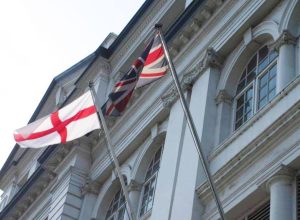Myanmar’s military junta has expelled the head of the United Kingdom’s embassy to the country, deepening further its diplomatic isolation from the West. Pete Vowles, who arrived in Myanmar late last year, said on Twitter yesterday that he had been asked to leave the country by the country’s military administration, which seized power in a coup in February 2021.
“My time in Myanmar comes to an abrupt end today,” Vowles wrote. “Sad & sorry to have been forced by the junta to leave but glad we didn’t cave to pressure to legitimize their brutal coup.” He added, “I know the wonderful, strong & committed @ukinmyanmar team will continue to stand up & do everything we can for the people of Myanmar who want nothing more than peace, freedom & justice.”
Despite being appointed ambassador in July of last year, Vowles did not present his credentials to the military-run State Administration Council (SAC), despite repeated requests from the regime. According to a report by Nikkei Asia in May, London subsequently chose to downgrade his title to charge d’affaires ad interim in reaction to the deteriorating political situation in the country, prompting a four-month standoff during which the military junta refused to accept his appointment, and told the U.K. government to send an alternative candidate.
Vowles, who like many foreign envoys to Myanmar, has been publicly outspoken about the atrocities committed by the SAC, was actually locked out of the country for several months from late February, when he left his Yangon residence for regional consultations and the military government refused to issue the necessary re-entry visa. Vowles was eventually permitted to return to the country, and his Twitter activity indicates that he was in Yangon as of June 22.
This standoff in Yangon has been mirrored by a similar confrontation over Myanmar’s diplomatic representation in London. Shortly after the coup, Myanmar’s ambassador to the U.K., Kyaw Zwar Minn, pledged his loyalty to the opposition movement and called publicly for the release of Aung San Suu Kyi and other senior members of the National League for Democracy (NLD) government. He was immediately dismissed by the junta and locked out of the embassy in London by pro-military staff.
But Kyaw Zwar Minn has continued to occupy the ambassador’s official residence in northwest London, and refused to return to the embassy, which is occupied now by the junta’s chosen envoy. The SAC has requested the U.K. government to eject him but it has declined to do so, though it has urged Kyaw Zwar Minn to find alternative accommodation. The envoy has informed the government that he will only hand over the property to a representative of “the legitimate, elected government of Myanmar.”
Vowles’ ejection from Myanmar is the latest sign of the encroaching diplomatic freeze that has settled over relations between the military-ruled country and the democracies of the West. Many nations, including the U.K., the United States, Canada, and the European Union, have imposed a raft of economic sanctions on the military, leading members of the SAC, and enterprises connected to the armed forces.
Many have now also downgraded their diplomatic representation to Myanmar, as a reaction to the military coup and the junta’s subsequent crackdowns on fierce reprisals on peaceful protesters and the armed resistance alike.
In May, ABC reported that Australia’s Department of Foreign Affairs and Trade had selected a “senior career officer with ambassadorial experience in the region” to succeed former ambassador to Myanmar, Andrea Faulkner, who wrapped up her term in April, and function as a charge d’affaires. A number of other Western nations have made similar moves, either downgrading the status of their current resident and non-resident ambassadors, or refusing to appoint new ambassadors once a current envoy’s term expires.
So far, the military junta has shrugged off these Western moves, reciprocally downgrading its own diplomatic representation, and in general showing a disregard for outside opinion that recalls its earlier period of isolation prior to the opening of 2011.
“Let’s be honest, talk about reducing the level of diplomacy or not is their concern,” junta spokesperson Zaw Min Tun told reporters in May. “As a country, we will act in accordance with our foreign policy. And I just want to say that we will make a respond based on the national interest.”

































